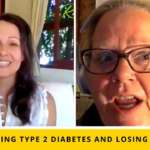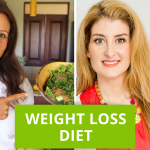Wondering how to fix your hormones and lose weight naturally without carbohydrate and calorie restriction?
You’ve probably already tried it all. The diets promise weight loss in less than a month and even hit the treadmill with conviction for months.
Yet, the unwanted belly fat and flabby arms still persist.
You can’t help but wonder: “What is it that I’m doing wrong? How can I finally get results with my weight AND maintain them long term?”
Here’s what’s interesting: your inability to lose weight is probably due to your hormones.
Succinctly put, certain hormonal imbalances have an effect on our overall weight, as well as our mood, energy levels and overall level of health.
Before we take a look at the specific hormones that contribute to weight gain, it is important to understand what a hormonal imbalance is.

An Inside Look Into Hormonal Imbalances
We’ve often heard the term, hormonal imbalance, getting thrown around in the medical circles, when we visit our doctor or even among some of our friends.
So, what exactly is a hormonal imbalance and what are hormones anyway? Hormones perform crucial roles within the body.
They act as chemical messengers, which means, that they relay important information throughout the body.
Produced by the endocrine glands such as the adrenals, hypothalamus, pancreas and thyroid, hormones control functions such as hunger, mood and even reproduction.
Examples of hormones include estrogen, thyroid hormones, progesterone, cortisol, melatonin, and testosterone.
They also help regulate body temperature, heart rate, metabolism, sleep cycles, mood, libido, and stress levels just to name a few.
A hormonal imbalance takes place when there is too little or too much of a particular hormone in the bloodstream.
Due to the crucial roles that hormones play within the body, a slight change in their normal production can cause major and even life-altering symptoms.
However, if your hormones are properly balanced, your health is sure to thrive.
Now, how can one tell if they have a hormonal imbalance?
Here’s one interesting fact about hormonal imbalances – as you age, the hormone levels in your body generally decline.
So by the time you reach your mid 30s and 40s, you can start noticing significant changes in your body.
You might find that you are not as healthy as you thought you were, your body is just not as robust as it once was and you’re starting to experience more health issues.
For example, you can start gaining weight and feel heavier.
You might feel tired after doing just the usual everyday things, let alone doing exercise.
You can start to experience big changes in your emotional state.
So let’s take a look at some of the hormones that you really need to stay on top of to help you age with glow and grace.
Symptoms of Hormonal Imbalances
If you’re looking to fix your hormones and lose weight, you need to keep tabs on your hormones. The only way to do this is to check for the symptoms.
Below are some of the symptoms that indicate a hormonal imbalance:
- Anxiety
- Fatigue
- Insomnia
- Skin issues and changes
- Hair changes
- Weight gain
- Difficulty in losing weight
- Irritable bowel syndrome
- Excessive sweating
- Irritability/ mood swings
- Thirst
- Headaches
- Bloating
- Infertility
- The vision becomes blurred
- Tenderness of the breasts
- Depression
- Weak bones
- Unexplained changes in heart rate
- Increased or decreased urination
Notably, the symptoms that you experience are often dictated by the type of gland and hormone that is affected.
In this article, we will be focusing on the type of hormones that contribute to weight gain and/or make weight loss difficult.
Causes of Hormonal Imbalances
Now, what causes hormonal imbalances? You absolutely need to be aware of this in order to fix your hormones and lose weight.
There are natural causes of hormonal fluctuations such as puberty, perimenopause and menopause. However, the below causes are due to the choices we make.
Below are some of the major causes of hormonal imbalances:
- Poor diet
- Toxins
- Sedentary and unhealthy lifestyle
- Extreme stress levels
- Poor gut health
- Poor liver health
- Inflammation
How Your Liver Health Affects Your Hormones
What happens if the liver health is poor from an overload of toxins?
Well, your liver has two pathways for detoxification – known as phase 1 and phase 2.
In the first step (Phase 1) toxins are metabolized into other substances which then makes them easier to process.
Phase 2 is when your liver detoxifies the substances and makes them water-soluble so they can be excreted from your body.
However, if your detox pathways become overwhelmed and so fail to function properly, you will end up with a toxic overload in your body.
Toxins can start building up in your body, including your fat cells and even bones instead of being excreted.
So when your liver health is poor, you can start experiencing hormonal imbalances – for example, estrogen dominance.
Basically, once estrogen has done its job in your body, it goes to the liver so it can be broken down and removed.
But if your liver’s function is impaired due to being too toxic because of an unhealthy diet and lifestyle, it will be unable to remove unwanted estrogen efficiently.
This can then result in estrogen dominance, due to excess estrogen circulating around the body.
Estrogen dominance has been linked to serious health issues, including heart attacks, strokes, thyroid diseases and both breast and ovarian cancers.
Remember – the health of your liver has a big influence when it comes to your body’s hormonal balance and your weight.
So don’t turn away from your body when it’s asking for help – if your hormones and health are out of balance, take action today to address it.
How Your Gut Health Affects Your Hormones
There are 100 trillion bacteria in your gut and these have a huge impact on your health, including your hormone levels and your weight.
If your gut is out of balance and you experience poor digestion, constipation, gas, or bloating, then you MUST address the health of your gut.
Your gut health will be affected by conditions like SIBO, IBS, IBD, parasites, leaky gut, Candida (yeast), and other imbalances.
A low thyroid is known to cause low stomach acid and negatively affect the movement of food through your gut as well.
An imbalanced gut microbiome, known as dysbiosis, has been linked to various metabolic disturbances that can impede weight loss.
Dysbiosis may lead to chronic inflammation, which is associated with insulin resistance, a condition where cells become less responsive to insulin, disrupting glucose metabolism and promoting fat storage.
Additionally, an unhealthy gut may influence the release of certain peptides and neurotransmitters that regulate hunger and cravings. Imbalances in these signaling pathways can contribute to overeating and, consequently, weight gain.
So as you can see weight loss is much more than just the calories that you eat!

Hormonal Imbalances in Women
As women, we go through three distinct stages in life:
- The first is when menstruation begins
- The second is when you have children
- The third stage is when you enter the menopause
Further to these three stages, there is another stage that we also go through – peri-menopause.
Peri-menopause can start as early as 35. If you have not been paying proper attention to your health and you are in your mid-thirties, or in your forties, this can have a big impact upon how you age and how you’ll go through the menopause.
Embarking on a weight loss journey after the age of 35 can be challenging, especially when hormonal imbalances come into play. These imbalances, commonly associated with fluctuations in estrogen, progesterone, and thyroid hormones, can thwart weight loss efforts and lead to weight loss resistance.
Aka you try to eat healthy, you try to exercise, you try to do all the right things, but your weight Just. Won’t. Budge.
Hormones play a pivotal role in metabolism, energy regulation, and fat storage.
As women age, hormonal changes can disrupt this delicate balance, making weight release a difficult task (that can seem like mission impossible at times …)
Take estrogen, for instance. Its decrease can lead to fat accumulation, especially in the midsection (sound familiar?).
An underactive thyroid, another common culprit, slows down metabolism, making weight loss an uphill battle. Approximately 1 in 8 women have hypothyroidism, which means they thyroid gland is under-active and is not functioning well.
A sluggish thyroid, which means that the thyroid gland is now producing enough thyroid hormones, can significantly impede weight loss. This metabolic slowdown leads to reduced calorie burning and energy levels, making shedding pounds challenging.
So balancing hormones is an essential part of healthy weight loss.

Hormones That Make People Gain Weight
To fix your hormones and lose weight, you need to make sure that everything’s in balance. There are five main hormones that are responsible for weight gain and/or difficulty in losing weight.
By knowing about the imbalanced hormones that are responsible for your weight problems equips you with an effective way of dealing it.
Here are the main hormones:
- Estrogen: Estrogen is a female hormone that is produced by the ovaries, as well as the adrenal glands. However, it is present in men too, but at lower levels. This is because, estrogen, which is also known as estradiol, is the main sex hormone for women, just as testosterone is for men. Estrogen controls how we react and interact with drink and food.
- Thyroid hormones: Thyroid hormones, primarily triiodothyronine (T3) and thyroxine (T4), wield considerable influence over the body’s metabolism, impacting weight loss and gain. When the thyroid functions optimally, it produces an adequate amount of hormones to regulate the metabolic rate – the speed at which the body converts food into energy. In cases of hypothyroidism, where the thyroid underperforms and hormone production diminishes, metabolic processes slow down. This metabolic slowdown results in decreased calorie burning and energy expenditure. Consequently, the body becomes more efficient in conserving energy, leading to weight gain or hindering weight loss efforts.
- Insulin: This hormone is responsible for ensuring normal levels of blood sugar or glucose. If there is too much sugar within the body, insulin is unable to transport glucose to body cells. This is known as insulin resistance, which is a condition responsible for diabetes and obesity.
- Cortisol: Cortisol is a stress hormone that is produced assist as during stressful situations. The more stressed you are, the more it is produced. This, in turn, encourages the body to store visceral fat around your abdomen. Additionally, it causes sugar cravings and food addictions.
- Adiponectin: This is a fat-burning hormone. Hence, the less it is produced, the more fat is likely to increase within your body.
Hormones Affect The Way You Age …
There are 4 hormones that can affect your ageing and these include:
Insulin
More than 100 million people in the USA alone have pre-diabetes or diabetes, according to statistics. This starts to cause many negative changes in your body.
If or when insulin resistance develops into full-blown type 2 diabetes, this can result in:
- Heart and blood vessel disease
- Kidney damage
- Eye damage
- Nerve damage
- Toe/foot or leg amputations
- Adrenal fatigue
- Alzheimer’s disease
- Hearing problems
High levels of insulin can also have a direct influence on how you age.
Estrogen
Another hugely important hormone is estrogen, which is produced by your ovaries and also produced by your adrenal glands.
Your estrogen levels begin to decline as you approach your mid to late forties (for some women it can start earlier).
If you have weak adrenal glands, then they will not be able to produce enough estrogen. As a result, menopause can become a much more painful experience.
Progesterone
Progesterone levels start to decline after your mid-30s and this hormone gives you that glowing look.
When this hormone declines, your skin starts to look dull.
If you have a health problem like PMS, PCOS, or fertility issues, then this can start lowering you progesterone levels even further and you can age more quickly.
So if you’re aging too fast, these 3 hormones might be out of balance.
Knowing all this … how do you want to age?
What reality do you want to experience as you get older?
This is an important question to ask yourself now. Start making the right choices today!

The Best Diet For Weight Loss (According To Science)
“There’re so many weight loss diets out there, which one is best for me?”
Good question!
There was a study published in The International Journal of Applied and Basic Nutritional Sciences, and they compared the amount of weight lost by people on various eating plans. (1)
Participants who took part in this 6-month study ate 5 different diets:
- Omnivore diet, which includes all animal products
- Semi-vegetarian diet with occasional meat intake
- Vegetarian diet, which excludes meat, poultry and fish, but includes dairy
- Pesco-vegetarian diet, which excludes meat, but includes seafood
- Plant-based diet, which excludes all animal products
At the end of the six months, those people who were eating the plant-based diet lost more weight than people on any other diet by an average of 4.3%, or 16.5 pounds in weight!
Furthermore, weight loss results on a vegan diet started appearing after just 2 months of them following it.
The plant diet group also showed the biggest amount of decrease in their fat levels at the two and six month checks, had improved macro nutrients more than the other diets and also had lower BMIs.
Strategies We Give Our Clients To Optimize Hormones And Lose Weight
1. Lower your body fat percentage
The excess body fat that you may carry is biologically active.
It releases inflammatory molecules into your body on a consistent basis and can even lead to serious health challenges, like type 2 diabetes, high blood pressure, hormone and fertility issues.
Losing weight with a raw food, vegan and plant-based diet has many advantages and there is plenty of proof that it works — from scientific findings through to people’s personal weight loss results.
The great news about eating this way is that the foods that you consume will not be junk, energy-draining and health-stealing foods.
Whole, plant foods don’t contain dangerous additives, or animal hormones and instead are loaded with life-supporting nutrients, including vitamins, minerals, antioxidants, fiber, and endless other health-promoting nutrients.
We talk about how to reduce your body weight with plant foods here.
2. Watch out for endocrine disruptors in your environment
There are literally hundreds of chemical endocrine disruptors in our environment nowadays and these chemicals can have a very negative impact on our hormones.
Common sources of these unwanted chemicals are personal care products, canned food, drinking water, conventionally grown produce, dairy products, animal meat (including fish), plastic products, cleaning products and many more.
3. Fiber (from whole plant foods)
Most people’s diets are sorely lacking in this vitally important nutrient and the health benefits associated with it are seemingly endless.
Fiber helps greatly with your digestion, elimination, and attracting and nurturing friendly gut bacteria.
It also acts as a kind of brush that helps remove used and unwanted hormones from your body, like cholesterol and estrogen.
These used and unwanted hormones can otherwise stay within the body and have the potential to cause serious health issues, such as heart disease and even cancer.
4. Remove unhealthy inflammatory Foods
Animal meats that themselves contain animal hormones and even antibiotics.
There was a famous study carried out called the Harvard Nurses Study, which followed 18,000 women.
They were trying to get pregnant for 8 years and as part of the study they noted down what foods they consumed. What they found was striking.
They discovered that by adding just a single serving of meat per day, their risk of infertility increased by 30%.
So this meant that eating meat and in particular poultry appeared to negatively interfere with their ovulation.
In fact, a single serving of chicken (half a chicken breast) a day was associated with more than a 50% increase in infertility.
Here are some other foods that can cause inflammation:
- Processed foods
- Refined sugar and salt
- Gluten
- Fried food
- Coffee
- Alcohol
All these undermine your health and so negatively impact your hormones.
So remove them from your diet and instead replace them with whole plant foods.
5. [1] Eat Healthy Fats, in Healthy Amounts and a Healthy Ratio
Only fats from whole plant foods need to be on your menu plan.
So that means nuts, seeds, avocadoes, olives and coconut flesh. Oils are not healthy fats and here’s our article about them.
Your omega 6 to 3 ratio needs to be in balance as well, with 1:1 and up to 4:1 of Omega 6 to 3 being healthy ratios.
6. Appropriate Levels of vitamin D
Many of us live in climates that naturally have less than adequate amounts of sunlight and this can greatly impact our vitamin D levels.
If you don’t get enough vitamin D from sunlight (and most people living in the cold climates don’t), then your next best choice is supplementation. Making sure that you have enough of the hormone we call vitamin D in your body is crucial for your general well-being. Aim to stay in the range of 50-80 ng/ml in order to maintain healthy vitamin D levels.
7. HIIT and Strength Training
Science is now telling us that high-intensity interval training (HIIT) is more beneficial for your body than long-duration cardio exercise.
Long cardio sessions can negatively impact hormones such as your thyroid hormones and increase cortisol levels and inflammation.
Interval training, along with strength training on the contrary, increases human growth hormone, slows down aging and helps you balance hormones.
One study showed how a 30-second sprint increased Human Growth Hormone by a whopping 430%!
Let’s recap and go over the strategies to help you balance your hormones naturally:
1. Lower your body fat percentage by balancing your diet and lifestyle
2. Watch for endocrine disruptors in your environment
3. Eat a fiber-rich diet
4. Remove unhealthy, inflammatory foods from your diet
5. Eat healthy fats and healthy levels of fat, including a healthy omega ratio
6. Appropriate levels of vitamin D
7. Correct exercise routine
Losing Weight With Plants
It’s true a plant-based diet can help you lose weight, however there are still many unhealthy processed foods even on a vegan diet that can negatively impact your health.
When you start eating a large proportion of your food from raw fruits and vegetables (without necessarily being 100% raw), you’ll notice greater and more rapid changes to your health.
5 Essentials For Losing Weight With A Plant Food Diet
- Detoxify your kitchen.
Most people’s kitchens lack in fresh fruits and vegetables and are overloaded with unhealthy, toxic, refined, and fatty foods.
It’s going to be much more difficult for you to focus on eating healthily when your house is full of tempting junk foods of the past.
So, you will need to replace your old and unhealthy foods with raw fruits, vegetables, nuts, and seeds and display them around your house.
Whenever you’re hungry, just reach out for healthy fruits, veggies and some nuts or seeds!
- Become friends with sugar.
“Whaaaaaaat???? Eating sugar for weight loss?”
Yep. It is very important to eat enough sweet, ripe fruit and healthy whole food carbohydrates on this lifestyle to meet your calorific needs.
The healthy whole food sugar that you get from fruit is very different to the processed sugar you get from junk food. Let’s not confuse the two.
I’ve been following a high fruit, high carbohydrate diet for 15 years myself, I’ve gone through pregnancy and breastfeeding, hormonal shifts, and stressful events and one thing that’s always been effortless to maintain is my weight. I’ve literally been maintaining a healthy weight year in and year out without any struggle … while eating all the delicious whole-food carbs and calories I care for!
Under eating on fruit and whole-food carbohydrates will make you want to eat dense or fatty foods.
So ensure that you eat a sufficient amount of calories to meet your personal needs, which includes things like gender and your level of activity. In other words – eat your carbs!
Unprocessed and unrefined simple carbohydrates are the ideal fuel source for our bodies, which they easily convert into energy so that we can carry out all our daily activities.

Underating on carbohydrates and following low-carb diets (where you over-eat on fat and protein) can lead to many health issues, including premature ageing, kidney disease, impaired liver function, skin conditions (i.e. acne or eczema), weight gain (which is the opposite of what you want), and more.
- Eat plenty of green leafy vegetables.
Green leafy vegetables (such as lettuce, kale, dandelion greens, spinach, etc.) are great weight-loss foods. They are low in calories and fill you up due to their volume.
They include an abundance of vitamins including; A, B’s, C, E, K and folate.
They are also rich in minerals, including iron, magnesium, manganese, selenium and zinc, and they’re a great source of healthy protein.
- Include 1 big green smoothie per day.
We recommend you starting your day from a fruit breakfast and then have a big green smoothie for lunch.
Drinking 1 green smoothie per day, which you’ll load with fruits and green leafy vegetables is a great way to consume your calories and nutrients.

Getting more calories from fruits and greens will cut the likelihood of you eating junk and processed foods, which means you’ll achieve faster results with losing weight with a raw food diet.
Plus, green smoothies are just so delicious!
- Keep yourself active!
No one will be able to succeed on this lifestyle and reach optimal health without doing a sufficient amount of exercise. Exercising before your meals, especially first thing in the morning will raise your metabolism and will awaken a true natural sense of hunger.
Exercise is also a great remedy for shifting negative thoughts and bringing you into the present moment – the place where you are fully aware and alive and can make healthy choices for yourself.
So incorporate weight lifting or bodyweight exercises into your routine 3 times per week, mixed with cardio sessions, such as jogging or running, biking, swimming or dancing. Aim towards doing at least 30 minutes of movement per day 5 days a week.
Ready for your next step?
We’ve put together meal plans, shopping lists and proven weight-release strategies to help with losing those excess pounds faster than ever before.










Is it possible to still balance hormones after having a hysterectomy?
You can certainly improve your hormonal balance with the right diet and lifestyle plan, which we would definitely recommend being a vegan whole foods one, based on plenty of fruits and fresh vegetables.
Thank you very much for the post! This has answered a lot of my questions regarding what has been happening to me during my own menopause.
So glad you found it useful!
The HIIT and strength training are definitely something I am going to start doing to lose my excess belly fat.
Good for you! Excellent plan.